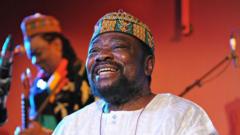In the world of music, the loss of Teddy Osei, the legendary Ghanaian saxophonist and co-founder of the Afro-rock band Osibisa, has resonated deeply following his passing at 88 years old in London. Known for his exceptional talent as a multi-instrumentalist and profound impact on music beyond borders, Osei's influence will be long remembered. The announcement of his death came with tributes highlighting his vital role in merging African sounds with global music, emphasizing his contributions as a cultural ambassador.
Born on December 1, 1937, in Kumasi, Ghana, Osei's musical journey began early, encouraged by his father's involvement in prominent school bands. He developed a love for the saxophone during his studies in Sekondi, eventually winning a government scholarship to London in the 1960s for music and drama education. There, Osei created the band Cat's Paw, blending highlife rhythms with rock and soul influences.
In 1969, he co-founded Osibisa with fellow Ghanaian musicians Sol Amarfio and Mac Tontoh. The group's name, rooted in the Fante language, translates to "highlife." Osibisa's unique fusion of African rhythms with rock, jazz, and funk positioned them at the forefront of global music, making significant strides on the international scene and achieving chart-topping success with hits like "Sunshine Day" and "Dance the Body Music."
Osei's dedication and innovation on stage garnered adoration across continents, culminating in memorable performances, including Zimbabwe's independence celebrations in 1980. His passion for promoting African music internationally was evident throughout his career, as he aspired to inspire and create recognition for African artists.
Reflecting on his work in a 2021 interview, he emphasized his desire to "make a difference to the African music scene." Osei identified Osibisa as pivotal in paving the way for future African pioneers like Fela Kuti, whose Afrobeat revolution would not have been possible without Osibisa's trailblazing roots.
As the news of Osei's passing reverberates across the music world, his legacy continues to inspire future generations of musicians and cultural enthusiasts, ensuring his invaluable contributions to the African music landscape will not be forgotten.
Born on December 1, 1937, in Kumasi, Ghana, Osei's musical journey began early, encouraged by his father's involvement in prominent school bands. He developed a love for the saxophone during his studies in Sekondi, eventually winning a government scholarship to London in the 1960s for music and drama education. There, Osei created the band Cat's Paw, blending highlife rhythms with rock and soul influences.
In 1969, he co-founded Osibisa with fellow Ghanaian musicians Sol Amarfio and Mac Tontoh. The group's name, rooted in the Fante language, translates to "highlife." Osibisa's unique fusion of African rhythms with rock, jazz, and funk positioned them at the forefront of global music, making significant strides on the international scene and achieving chart-topping success with hits like "Sunshine Day" and "Dance the Body Music."
Osei's dedication and innovation on stage garnered adoration across continents, culminating in memorable performances, including Zimbabwe's independence celebrations in 1980. His passion for promoting African music internationally was evident throughout his career, as he aspired to inspire and create recognition for African artists.
Reflecting on his work in a 2021 interview, he emphasized his desire to "make a difference to the African music scene." Osei identified Osibisa as pivotal in paving the way for future African pioneers like Fela Kuti, whose Afrobeat revolution would not have been possible without Osibisa's trailblazing roots.
As the news of Osei's passing reverberates across the music world, his legacy continues to inspire future generations of musicians and cultural enthusiasts, ensuring his invaluable contributions to the African music landscape will not be forgotten.



















